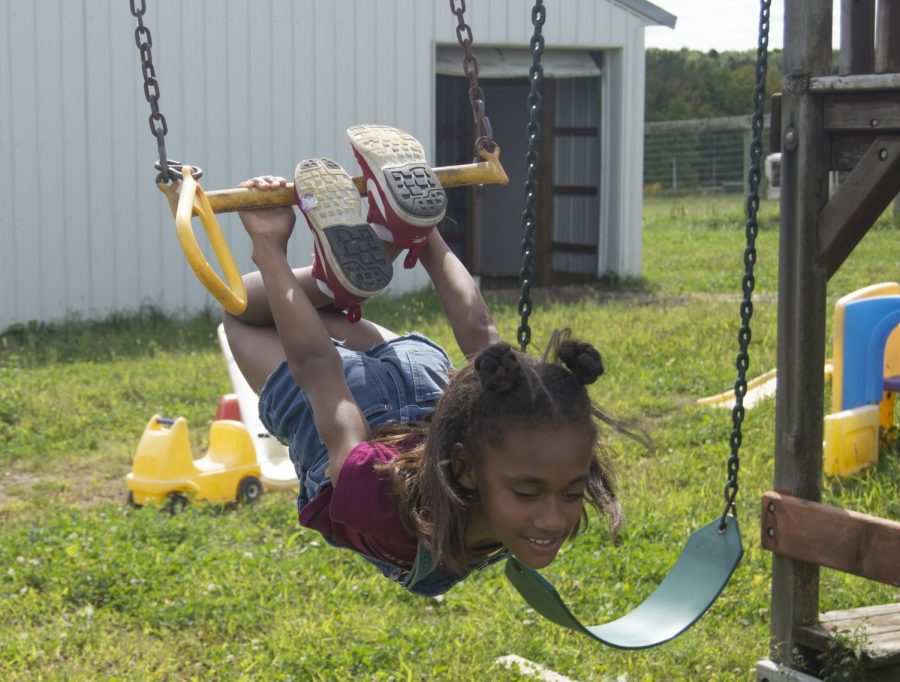Big Brothers Big Sisters bonds mentors, mentees
September 10, 2019
As Michele Delgross sits in her living room, she’s reminded of the life she had while raising her now adult children. It’s almost a bittersweet moment, until she receives an excited text message from a little girl that sees Delgross as her older sister.
Delgross is a volunteer mentor for Big Brothers Big Sisters of Portage County, a program that matches children living in Portage County ages six to 17 with a volunteer over the age of 18, providing the child with a mentor they can look up to and learn from.
Program manager Andrea Neidert said mentees, also known within the program as “littles,” face a variety of challenges, ranging from struggling with school work and lacking social skills to dealing with poverty, drug abuse or homelessness.
Neidert said children living in these situations generally don’t have access to conventional mentors.
“Most of our families are low income, so they don’t have the funds or time for children to join things with the usual mentors, like sports teams … or scouts,” Neidert said. “So we can provide these mentoring relationships that they maybe wouldn’t have access to otherwise.”
The relationships mentors build with their mentees are meant to provide children struggling in these situations with a positive outlet for their emotions, while also helping them to cultivate productive mindsets and actions.
“Through studies, we see that children who have these mentoring relationships actually do better in school, they have higher expectations of their own educational abilities, … and are less likely to start risky behaviors,” Neidert said.
The study Neidert referred to was conducted in 1995 by Public/Private Ventures, a research organization based in Philadelphia. The study surveyed 950 children involved in the program, and assigned half of them mentors for 18 months, while the others were put on a waitlist.
The study concluded that littles paired with big siblings were 47 percent less likely to use illegal drugs and 52 percent less likely to skip school, while also having more confidence and better relationships with their families than those on the waitlist.
Mentors are encouraged to make an impact on their mentee by engaging them in activities they enjoy, or may not have much exposure to at home.
Delgross, who has been a mentor for about a year, said she and her little do a lot of things together, including horseback riding, hiking, biking and dog walking.
“Sometimes I’ll be like, ‘Hey, what do you want to do?’ If there is something she definitely wants to do, we’ll do that. And sometimes I’ll say, ‘Hey, do you want to do this?’” Delgross said. “We work together.”
Some children may need more time to open up to their mentor than others, but many mentors find success with their mentee due to the precise matching process.
Delgross said her mentee is already becoming more confident and social.
“She’s not really talkative in novel situations, so I just try to get her to open up, and she does with us,” Delgross said. “Part of that could be that she’s very comfortable around me and she knows I’m not going to take her anywhere that is not a safe zone and is not somewhere she can’t be herself.”
David Zamos, a retired musician and Kent State alumnus, said he encourages his mentee to understand that people are different, and not to be deterred by that.
“I think the most impact I had on him, maybe, is that somebody old enough to be his grandfather, of a different race, can still be a positive force in his life,” Zamos said. “People can have a difference of opinions and still get along and respect each other.”
Neidert said she would encourage Kent State students to volunteer, but they must understand the time commitment involved in being a mentor before volunteering.
“They have to really sit and think, ‘Every week do I have two hours or three hours to spend with this person?’” Neidert said. “They just need to make sure they can make that commitment, and for a year; not for three months and not when it comes to the next semester.”
Volunteer mentors are expected to spend 12 hours per month with their mentor for at least one year, but many mentor-mentee pairs choose to spend more time bonding with one another.
Delgross said the relationship someone can build with a mentee is so positive, she would not want anyone to miss out on it.
“It’s amazing,” Delgross said. “If you’ve got just a little bit of time … to share that with a child that is looking for additional experiences in life, it’s rewarding for them and rewarding for you.”
Contact Zaria Johnson at [email protected].

























